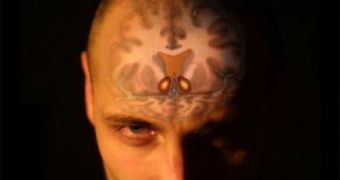According to a new scientific investigation, it would appear that an irregularity in the way the human brain processes dopamine is one of the main factors that trigger the emergence of psychopathy. Researchers from the Vanderbilt University made the discovery, and they argue that what this basically means is that the brain becomes primed, or wired, to seek rewards at all times, regardless of the consequences that these prospective actions would bring down on the person doing them. These new data provide researchers with a new avenue in studying this condition, PhysOrg reports.
“This study underscores the importance of neurological research as it relates to behavior. The findings may help us find new ways to intervene before a personality trait becomes antisocial behavior,” says of the study the director of the US National Institutes of Health (NIH), Dr Francis S. Collins. Details of this study and its conclusions appear in the March 14 issue of the esteemed scientific publication Nature Neuroscience.
“Psychopaths are often thought of as cold-blooded criminals who take what they want without thinking about consequences. We found that a hyper-reactive dopamine reward system may be the foundation for some of the most problematic behaviors associated with psychopathy, such as violent crime, recidivism and substance abuse,” adds Vanderbilt University Department of Psychology graduate student Joshua Buckholtz. He was also the lead author of the new journal entry.
This particular study is different than others focusing on psychopathy for a very simple reason. Rather than looking at the aspects that patients seem to lack, as in emotions including fear and empathy, as well as interpersonal skills, the group looked at the emotions or behavior that psychopaths express plentifully. These include massive risk-taking, the active search for rewards regardless of the consequences, and impulsivity. The team says that these are the factors more likely to define the condition, rather than those that are absent.
“There has been a long tradition of research on psychopathy that has focused on the lack of sensitivity to punishment and a lack of fear, but those traits are not particularly good predictors of violence or criminal behavior. Our data is suggesting that something might be happening on the other side of things. These individuals appear to have such a strong draw to reward – to the carrot – that it overwhelms the sense of risk or concern about the stick,” adds Vanderbilt associate professor of psychology and of psychiatry, Davic Zald. He was also one of the coauthors on the study.

 14 DAY TRIAL //
14 DAY TRIAL //